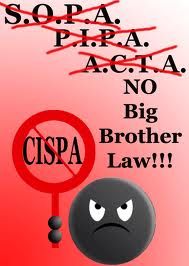This administration, especially the Department of Justice really hates your Fourth Amendment rights and is doing everything in its power to narrow your right to privacy as much as it can.
DOJ Says Americans Have No 4th Amendment Protections At All When They Communicate With Foreigners
by Make Masnick, Techdirt
We’ve already questioned if it’s really true that the 4th Amendment doesn’t apply to foreigners (the Amendment refers to “people” not “citizens”). But in some new filings by the DOJ, the US government appears to take its “no 4th Amendment protections for foreigners” to absurd new levels. It says, quite clearly, that because foreigners have no 4th Amendment protections it means that any Americans lose their 4th Amendment protections when communicating with foreigners. They’re using a very twisted understanding of the (already troubling) third party doctrine to do this. As you may recall, after lying to the Supreme Court, the Justice Department said that it would start informing defendants if warrantless collection of information under Section 702 of the FISA Amendments Act (FAA) was used in the investigation against them.
Last October, it finally started alerting some defendants, leading courts to halt proceedings and re-evaluate. As two of those cases have moved forward, the DOJ is trying to defend those cases, and one way it’s doing so is to flat out say that Americans have no 4th Amendment protections when talking to foreigners.
The Supreme Court has long held that when one person voluntarily discloses information to another, the first person loses any cognizable interest under the Fourth Amendment in what the second person does with the information. . . . For Fourth Amendment purposes, the same principle applies whether the recipient intentionally makes the information public or stores it in a place subject to a government search. Thus, once a non-U.S. person located outside the United States receives information, the sender loses any cognizable Fourth Amendment rights with respect to that information. That is true even if the sender is a U.S. person protected by the Fourth Amendment, because he assumes the risk that the foreign recipient will give the information to others, leave the information freely accessible to others, or that the U.S. government (or a foreign government) will obtain the information.
This argument is questionable on so many levels. First, it’s already relying on the questionable third party doctrine, but it seems to go much further, by then arguing that merely providing information to a foreign person means that it’s okay for the US government to snoop on it without a warrant.
The official US position on the NSA is still unlimited eavesdropping power
by Jameel Jaffer, the ACLU at The Guardian
One year after Snowden, the government is defending – in not-so-plain sight – the ‘paramount’ power to spy on every call and email between you and your friends abroad
The government’s argument is not simply that the NSA has broad authority to monitor Americans’ international communications. The US government is arguing that the NSA’s authority is unlimited in this respect. If the government is right, nothing in the Constitution bars the NSA from monitoring a phone call between a journalist in New York City and his source in London. For that matter, nothing bars the NSA from monitoring every call and email between Americans in the United States and their non-American friends, relatives, and colleagues overseas.
In the government’s view, there is no need to ask whether the 2008 law violates Americans’ privacy rights, because in this context Americans have no rights to be violated.
Marcy Wheeler at emptywheel points out that former Sen Russ Feingold warned us back in 2008 about the abuses that could occur under Section 702 of the FISA Amendments Act (FAA).

 The controversial data sharing bill,
The controversial data sharing bill,
Recent Comments